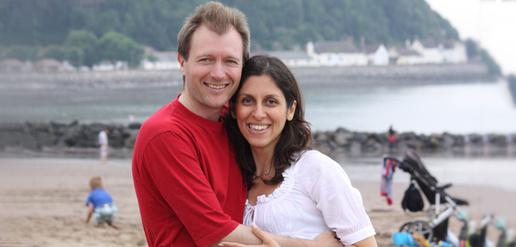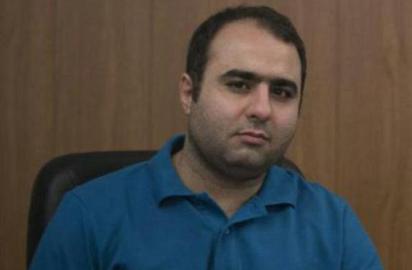Prosecutors overseeing the case against Nazanin Zaghari-Ratcliffe have admitted that she is a dual Iranian-British national for the first time since her arrest in April 2016. Her family say this new focus on her British citizenship as a reason for her incarceration is further proof she is being used as a bargaining chip with the West.
The Free Nazanin campaign and her family have called on both the Iranian and the UK governments to acknowledge that Zaghari-Ratcliffe, the British-Iranian charity worker currently serving a five-year sentence, is being used to apply leverage in various discussions and tensions between the two countries. The campaign demands that both governments take action in her case.
Speaking to IranWire, her husband Richard Ratcliffe said transparency was key to resolving the situation, and that the silence from officials on both sides had to end. “I have been pushing the [UK] government all along to be clear about what's going on, and pushing the government to be clear about the fact that Nazanin's rights are being abused, and that she didn't do anything. I said that a year and a half ago and I say that now. Now I'm also saying the Iranian government should also say her rights are being abused, and that she shouldn't be used in this way.”
On October 8, authorities informed Nazanin Zaghari-Ratcliffe, who was arrested in April 2016, that the Revolutionary Guards had opened a new case against her.
If found guilty, Zaghari-Ratcliffe could be held a further 16 years in jail.
In a press conference on October 17, the head of Tehran’s judiciary, Jafari Dolatabadi, highlighted that Zaghari-Ratcliffe is married to a British citizen and holds dual UK-Iranian nationality — a statement that directly contradicts previous claims by Iranian officials, who insisted that Iran does not recognize dual citizenship. In the cases of Iranian-Americans Jason Rezaian and Amir Hekmati, for example, Iranian officials routinely used this excuse to fend off appeals from US officials and campaigners.
Dolatabadi also made a number of claims that the Free Nazanin campaign, run by Zaghari-Ratcliffe’s family and supporters, have identified as false. He said she had worked for BBC Persian, and ran an online journalism course that trained people to disseminate propaganda against Iran. Both her family and the Head of the BBC World Service, Frances Unsworth, have stated that she never worked for BBC Persian. Eight years ago, she worked for the BBC World Service Trust (now BBC Media Action) for a period of one year, and was a project assistant for an online journalism course for young people in Afghanistan and Iran. A Free Nazanin statement referred to her role as "junior and administrative.”
Dolatabadi also said that Zaghari-Ratcliffe received a letter from former prime minister David Cameron when she worked for the BBC, and cited it as proof that she had close ties to the UK government.
But the Free Nazanin campaign said that she never received a letter, though Richard Ratcliffe presented a petition calling for her release signed by half a million people to Downing Street in May 2016. At the time, he appealed to David Cameron to speak up about Nazanin’s case.
"Nothing to Hide"
“My personal belief all along, and my belief strongly now, is that she is best served by the truth,” said Richard Ratcliffe. “And by being honest. We've got nothing to hide. She went on holiday, works for Reuters Thomson Foundation, she once worked for BBC Media Action. Yes, eight years ago, she did do some work on journalism training. She does journalism training now, or before the last year and a half. But there's nothing there.” He said that the judiciary had increasingly become preoccupied with his wife's links to the BBC, part of its new attempt to attach this to the crimes they argue she has committed.
In a CNN interview in September, President Rouhani was asked about the continued detention of dual nationals in Iran. In response, he said that Iran's judiciary was independent and he was very limited in what he can do — an argument that Richard Ratcliffe firmly rejects. "He's the president, and he's got a responsibility to protect them. And that obligation should be clear," he said.
Ratcliffe says that the fact Iran has finally admitted that Nazanin Zaghari-Ratcliffe is a British citizen should offer a clear path for her release. It should put an end to British refusal to speak out and do something about her case. To begin with, the British ambassador will be able to visit within 10 days.
Whether it’s because of the desire to develop greater business ties between the UK and Iran, an urge to protect the nuclear deal especially following President Trump’s recent statements, or just an exercise in saving face for both countries, Richard Ratcliffe says the current situation is toxic for both countries, and can only continue to damage relations.
“It's not fair and it's not safe for all of those Iranians with foreign connections if they want to go and travel and do business or whatever, that they could be exposed to being used in this way — and for no one to speak out for them. That's not good for Iran, let alone the UK.”
visit the accountability section
In this section of Iran Wire, you can contact the officials and launch your campaign for various problems

























comments